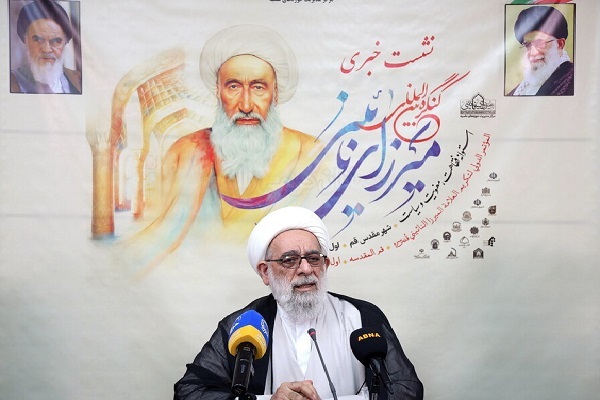Int’l Congress on Mirza Naini to Convene in Four Cities

In a press briefing on 20 October, the congress’s secretary-general, Hojat-ol‑Islam Ahmad Farkh‑Fal, said that the supreme reference-authority in Najaf welcomed the event and “expressed pleasure at hosting this international congress.”
The event in Iran will open on October 23 in Qom and close two days later in Mashhad. Iraqi cities of Najaf and Karbala will also host the conference from November 27 to 29.
Farkh-Fāl added: “Throughout Shia history there have always been great and renowned personalities who combated colonialism and stood against tyranny and despotism. Introducing these prominent figures brings many blessings for those who are distant in time from them. Reminding the struggles of the jurists, the greats and those who sheltered people in crisis is an instructive lesson for the correct path of the Islamic ummah in similar events.”
He continued: “Just as we remind people of the flow of Ashura and the self-sacrifice of the Companions of Imam Hussein (AS) so that they absorb the greatness of resistance and standing against oppression and follow them as a symbol.”
Read More:
Farkh-Fāl explained that one aim of the congress is to commemorate the 100th anniversary of the migration of Mirza Naini from Iraq to Iran. “In the year 1920”, when “the English colonial” rule under his agents—especially King Faisal I—in Iraq laid the table of colonialism, Mirza Naini initiated that great uprising. And when the British saw that his existence was incompatible with their aims, they exiled him from Iraq to Iran; his arrival and that of his companions sparked a movement in the seminary and in Iran’s social scene.”
He said that Mirza Naini believed that governance belongs to God and is not a personal possession. “God is the absolute owner of the world and governance is His,” he commented.
“After the rule of God comes the rule of the Prophet of God and the infallible Imam … Based on reliable traditions, after the infallible Imam, governance belongs to jurists who are fully qualified; those who, devoted to God, do not bow their heads to arrogance and do not sell the greatness of the Islamic ummah.”
On the inseparability of religion and politics, Farkh-Fāl said: “Mirza Naini did not see religion and politics as separated, and believed that if at any time access to the Imam is not possible, the most righteous and closest people in faith and independence from disbelief and atheism are worthy of governance.”
Read More:
Farkh-Fāl noted that in Mirza Naini’s Persian work Tanbīh al‑Ummah wa Tanzīh al‑Millah (“Warning to the Nation and Purification of the Community”) he raised the issue of constitutionality so that the Qajar despotism would be bound and conditional on Sharia. The scholar believed that senior jurists must participate in parliament, those who will not sell God’s religion for anything.
Farkh-Fāl said Mirza Naini is one of the glories of Shia history and the seminary. “If in any seminary the views of this great scholar are not discussed, it should be subject to criticism.”
He said: “About 200 papers arrived at the secretariat and after careful review 70 articles were selected. The papers came from the seminaries of Iran and Iraq. Five volumes of papers have been printed, and about 40 volumes in addition to an index of his works have also been published.”



